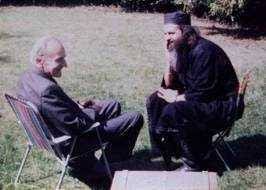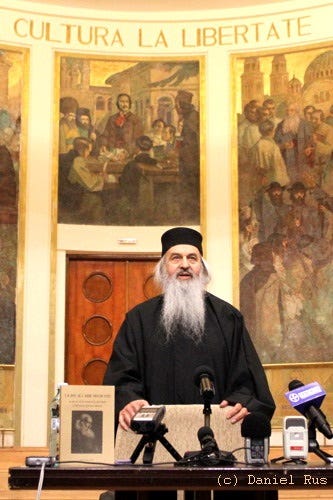Fr. Rafail Noica: Repentance is our true Culture
Only this path, this life, is worthy of the word culture. Culture, at the basic, primitive level is anything you cultivate. If you cultivate sin, then sin becomes your culture...
Excerpt from The Culture of the Spirit:
Repentance is thus something—if you understand it as I tried to explain [as a turning from death to life; a longing for eternal things]—of such a distinct, such great beauty, that in their divine inspiration the Fathers called it the science of sciences and the art of arts. And truly it is a science, and truly it is an art. What is art? It is creativity. Here man by his own will gives birth to himself in eternity. By his free will, he becomes his own parent, his own father, through divine grace that has the power to give birth. Therefore, through the free will that man gives God, that is, “I want, O Lord!” through this free will he gives birth to himself as his own father. And through the pain which he undergoes, he becomes—I dare say—his own mother; because he gives birth to himself in eternity through pain.
This path, thus, is true creativity; it is the creation of a god by grace. Man, the image and—when he attains it—the likeness of God, is nothing other than a god. Our spiritual father, Elder Sophrony, who had been an artist, a painter, especially a portraitist by trade, would say that God makes His self-portrait in man.
Infinitely great is the glory of the word repentance. Don’t let it be “slavery” anymore! Starting today, let it be the time of glorifying this lowliness. This is the true creation of man, this is the true science of man, not the knowledge of profane elements, which are somewhat comparable, but in no way can all that is human culture, art, and knowledge be compared.
Philosophy is also a word. The ancient philosophers, the Greeks, were not just abstract thinkers, like modern philosophers. They were men who had to show that their thinking was true through their way of life. And if their way of life proved that it worked, that their thoughts could be enacted, then it meant that their philosophy was true. And all the philosophies and religions could not attain perfection; the perfection of greek philosophy was in the altar that Saint Paul found in Athens, the altar consecrated to an Unknown God.
The perfection of philosophy and human thinking arrives at knowing that “I know nothing.” Socrates said, “One thing I know, that I know nothing” (Έν οΐδα, ότι μηδέν οΐδα). And this is the perfection of all that is earthly.
And then, poverty of spirit [the first beatitude], that “I know nothing.” Then God can come with His word, and Saint Paul came with the divine word to Athens. For better or worse, they received it, because there were still caught in their pride as philosophers. But a Dionysios, and maybe one-two more, were found who worked to illuminate the Greek people. But our Fathers, maybe especially in the time of Saint Basil the Great, and many of those who were pagans converted to Orthodoxy, to Christianity, baptized into Christianity, who knew all of ancient greek culture and the glory of philosophy and so forth, recognized the Christian ascetic life, which I just described—the Beatitudes and the journey to eternity—as the only true philosophy. This is the highest form of thought, the only worthy one of man, and the only one man can enact in history and eternity. No other philosophy could be enacted, neither perfectly in history [i.e. time] without being destroyed in eternity. And so the path of repentance, our lowly servitude, is the science of sciences, and a true science.
If you read the Philokalia and other books, you will see in what detail the Holy Fathers knew to delineate where sin begins and ends, where human activity is, and where divine grace begins. It is a true science, and an exact science, but a science of eternity, not of passing, earthly things. And when I say earthly and passing, I don’t want to just say that “today I live and tomorrow I will die,” but earthly and passing is a quality.
Science, art–just like creativity–is a cultivation of beauty, be it in color, line, and form, in sound, movement, or in word. All these are included in the word art. But art, as words themselves show, is artificial. There is an artificiality in it. But in divine things we don’t play artificially, like an actor in his theater role—“artificial” because he won’t become what he is playing. We begin to live that which we will also become. God’s eternity is, as you all know, Paradise. All, at least intuitively, know that there is indescribable beauty, and that indescribable beauty is you, O soul, who will become the likeness of God. This becoming into the likeness of God (Being par excellence) as I said before, is becoming into being [a philosophical expression coined by Constantin Noica], and it is the accomplishment of the highest form of art. It is the beautifying of our deathly image into the eternal and undying beauty of God—the incorruptible beauty of God.
And so repentance and Christian asceticism, correctly understood, are worthy of being called the art of arts, the science of sciences, and [true] philosophy [t.n, known as “practical philosophy” in Evagrios and Maximos the Confessor]. I dare to say, if you allow me this presumptuousness today, that only this path, this life, is worthy of the word culture. Culture, at the basic, primitive level is anything you cultivate. If you cultivate sin, then sin becomes your culture. If you cultivate what we normally call culture, this becomes your culture. But, I repeat, all is “a sky and an earth,” [cf. Eminescu] and all perish along with the sky and earth.
The only thing worthy of culture is repentance and asceticism correctly understood. And, I would like to emphasize that “correctly understood” is almost synonymous with “Orthodoxy,” which in Greek means “right worship,” because we correctly worship God if we become His likeness; and it also means “correct opinion,” correct understanding. And, if we understand the word repentance correctly, it is the only word worthy of the name culture.
And if you allow me to continue with my presumptuousness, then where we are right now is not a House of Culture [Cultural Center]. Only the Church and your room when you pray in it is a cultural center. And I will conclude with this: if God hears my prayer, this will be the last time you hear me speak anywhere other than in Church. If God hears my prayer, when I am outside my cell, if someone wants to find me and hear me, let him look for me in Church. I would like to remain there until the end of the ages, and I would like to invite all my brothers and sisters to imbibe ourselves with God’s beauty. May God help us all!









This is the most beautiful word on repentance I've ever heard, the quintessence of the Orthodox science and art, the culture of love and renewal.